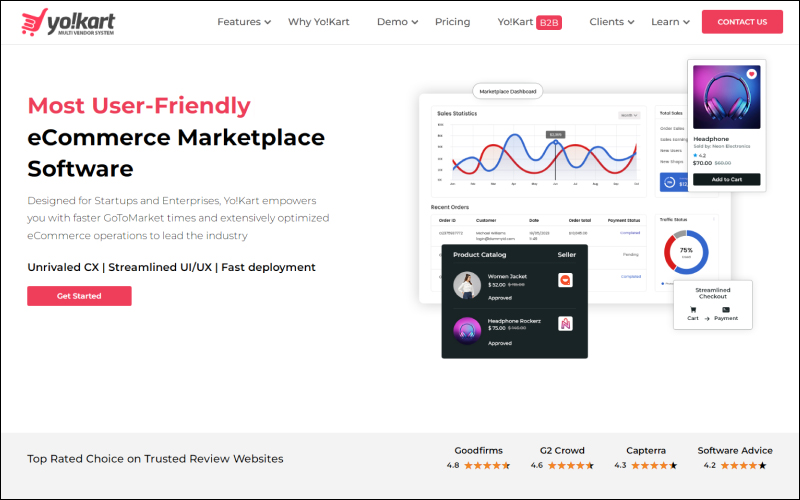The increasing number of individuals considering online shopping for convenience over physical shops has increased the surge of eCommerce to a great extent. This shift in surge can be attributed to several factors such as the ability of eCommerce websites to address the changing customer needs with ease. These websites offer a wide range of products, allowing customers to shop with ease.
The two notable online marketplaces in the eCommerce industry, Amazon and eBay have become inspirational examples, all due to their strong foothold in multiple niches. Besides, quality, revenue, and exceptional customer service are some of the key metrics that make such online marketplaces stand out. According to Statista, revenue in the eCommerce Market is projected to reach US$3,567bn in 2024. Revenue is expected to show an annual growth rate (CAGR 2024-2028) of 8.95%, resulting in a projected market volume of US$5,026bn by 2028. This simply indicates that the revenue for eCommerce websites is growing bigger each day.
So, if you are one of those entrepreneurs inspired by giants like Amazon and eBay and want to build similar eCommerce websites, this blog is for you. In the coming sections, we will cover valuable factors to be considered for how to create a website like Amazon or eBay.
Building a website like Amazon and eBay requires the incorporation of out-of-the-box features. It includes security, easy navigation, effective marketing, user engagement, and more. Below, we will explore the must-have features to help your eCommerce business set a strong foothold and achieve sustainable growth.
Intuitive Dashboard:An intuitive dashboard helps marketplace admins monitor key metrics such as best-selling products, customer demographics, revenue distribution based on multiple aspects, etc. These further help better understand the buyer's needs and make informed decisions to address those requirements.
Marketing Tools:No business can thrive without having a presence on multiple online channels. For spreading word of mouth and maintaining a consistent flow of customers on the platform, investing in paid advertising and social media marketing would be required. In addition, social media integration is vital in marketing your eCommerce marketplace.
Advanced Analytics:An eCommerce marketplace integrated with analytical tools like Google Analytics can help greatly in analyzing sales data, understanding customer behavior, and further making informed business decisions.
24/7 Customer Support:The customer support feature helps resolve queries and complaints. Besides, having efficient communication channels like email, calls, live chat, and more can help in addressing customer concerns promptly.
Easy Signup:An easy and smooth registration process is a must to avoid customers abandoning the platform. Keep the steps minimal, enabling the buyers to add a few details like name, and email, and added convenience of logging in with their Facebook or Google account, making the process seamless.
Buyer's Profile: A personalized buyer's profile enables the addition or editing of personal information such as name, address, payment preferences, membership & subscription, etc. Also, buyers can check their order history, track new orders, change language preferences, and so on, enhancing their buying experience.
Advanced Search Module:A powerful search feature helps buyers fetch the relevant product details based on name, category, type, size, etc. Furthermore, adding a voice search feature can make the buying experience more convenient for the buyers.
Multiple Payment Methods: The digital payment ecosystem is vast and buyers expect multiple payment gateway choices. Having popular payment gateway options integrated like Stripe, PayPal, Apple Pay, and more can make the checkout process quick and hassle-free.

Product Listing:Sellers can efficiently manage product listings, create product variations, and edit or remove products. It will enable sellers to keep track of their inventory such as product out-of-stock, availability of best-selling items, and so on.
Vendor Dashboard: A personalized vendor dashboard helps them gather detailed insights into their products. The sellers can stock the products based on the worst and best ratings, collect customer feedback, analyze their best-selling items, and so on. All of this will help them in better decision-making.
Order Management:It enables sellers to access the complete information of orders, from order request until delivery. In addition, the sellers have access to accounting details with which they can manage order cancellations, replacements of items, and refund requests.

There are three most popular and widely used approaches to creating websites like eBay and Amazon that fulfill the core operations of your business. You can choose the one that best aligns with your requirements.
Build Yourself:Building an eCommerce website from scratch requires technical expertise and coding skills. You have to focus on each minute detail like using an accurate theme, integrating third-party APIs, and designing a user-friendly interface. So, if you are someone who has knowledge of coding to develop an ecommerce marketplace then this option is the best for you. However, the entire process is time-consuming and requires a lot of effort, increasing the time-to-market of website launch.
Hire Professional Developers:Another approach you can consider is to hire a team of in-house experts or source the requirements to eCommerce development companies. No matter which opinion you choose, a lot of hours will be consumed plus the development cost would be high.
Use a Readymade eCommerce Software:While building from scratch may seem a good option as it gives complete flexibility for marketplace customization, using turnkey software can be a more viable choice. These solutions are equipped with core features and functionalities, providing businesses with a competitive advantage. Furthermore, leveraging turnkey eCommerce software is cost-efficient, reduces the product's time-to-market, and enables focusing on incorporating the unique capabilities that align with the user's needs.

Yo!Kart is the best eCommerce multivendor marketplace solution for aspiring entrepreneurs to launch their online marketplace akin to Amazon and eBay. Yo!Kart has state-of-the-art features and functionalities that ease the work process of the entrepreneur, allow sellers to sell their products easily, and provide an intuitive experience to the customers.
Keeping in mind various aspects of eCommerce, the functionalities have been put in place. The performance and security of the system have been tested minutely to avoid any lag post-launch. Yo!Kart comes with complete ownership of source code, enabling complete control over platform customization according to the needs of the business.
The software has been trusted by clients from 50+ countries and billion-dollar startups to launch their eCommerce businesses. Moreover, 12 months of free technical support and free installation are provided, allowing entrepreneurs to focus on launching their businesses effectively.
To conclude, the popularity of online websites is on the rise, all due to their huge potential to connect people and businesses globally. Moreover, building eCommerce platforms such as Amazon and eBay is a great way to expand the business, build an online presence, and increase revenue.
However, remember that online websites can not be built in a day but the launch time must not even take months. So, to take advantage of the evolving eCommerce segment, your eCommerce journey depends on a few key aspects. You need to focus on the appropriate business model, brand vision, and the right eCommerce software for the development job. However, do consider customer demand, scalability, and operational efficiency.
To create an eCommerce website like Amazon and eBay, choose scalable software, incorporate out-of-the-box features and functionalities, plan for marketing initiatives, prioritize user-friendly design, and prepare the online marketplace for robust security.
What are the essential features of an eCommerce website?Essential features of an eCommerce marketplace include secure payment gateways, search and filtering choices, product listings, shopping cart functionality, 24/7 customer support, and more. These elements are vital for delivering a seamless shopping experience and building strong customer relationships.
How much does it cost to build a website like Amazon and eBay?The cost to build a website like Amazon and eBay may depend on multiple factors like functionalities, design, preferences, scalability, and development approach. You can check out our pricing packages to get an idea about the cost.